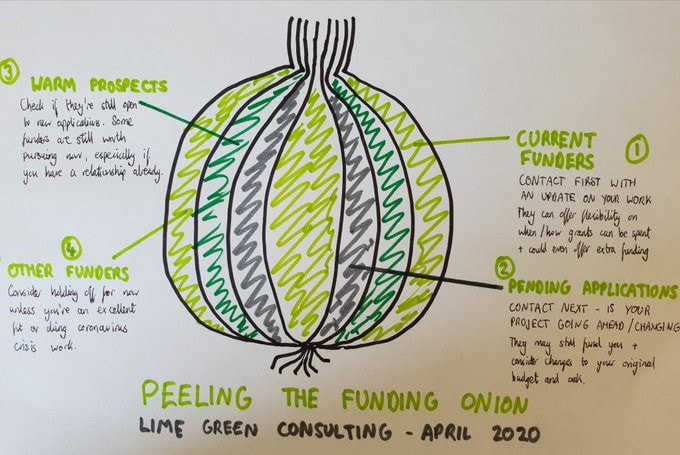|
Like many, I’ve been watching on with despair at the impact of coronavirus on the charity sector. One of the things we’re doing to help in our own small way is to run a series of free live Q&As to give small charities advice on how to deal with the crisis. During the first Q&A, amid the technical questions about emergency grant funding, urgent fundraising appeals and strategic planning, one question jumped out: “Are there opportunities in the general gloom?” I really don’t want to trivialise what is an incredibly tough time for many. The current crisis is likely to have a huge long-term financial impact. Many charities are facing closure or being tested like never before. At a time when there was already nowhere near enough funding to go around, this is one more straw added to the camel’s back. And as Emily Maitlis brilliantly said, coronavirus will disproportionately impact the poorest and most vulnerable people in our society. It’s no exaggeration to say that I worry about these things every day. But that’s not to say that there aren’t any positives in the gloom. New attitudes and ways of working are being born out of necessity, but some of them could be here to stay. At a time when we all need a boost, it’s helpful to highlight a few… The flexible response from fundersBarring a couple of horror stories, most funders have responded overwhelmingly positively and are rallying around the sector. They’re giving grantees an unprecedented level of flexibility in terms of how, where and when they spend the money. In general, funders are giving away more money more quickly, with easier processes and fewer restrictions and reporting requirements, than ever seen. It’s important to remember that many funders are also registered charities and have their own charitable objectives to adhere to. This often explains why they have restrictions and reporting requirements in place. However, sometimes it also comes down to control and trust. Funders are currently ceding this control to charities and trusting them to use their judgement on where money is needed most - and if charities prove that this trust is well placed, it’s possible that many funders will continue offering increased flexibility in future. If you're unsure how best to tackle funders in these unusual times, we've tried to explain through the unlikely medium of an onion: The groundswell of public gratitudePublic and media attention are focused on things like the NHS, food banks and grassroots community organisations like never before. The Prime Minister is praising the NHS for saving his life, and looking like he might even still remember it in six months. Conservative MPs are publicly questioning their assumptions about so-called ‘low-skilled workers’. You really do have to pinch yourself to be sure this is actually happening – although it’s a shame and disgrace that it took this level of crisis to prompt it. Of course, the challenge will be to maintain this level of public support whenever things go back to(wards) normal. Still, maybe I’m being naïve, but it does feel like there’ll be an opportunity to change long-term perceptions for the better, and keep up public pressure on decision-makers, if we can harness the amazing stories of community solidarity, and the levels of recognition and gratitude, that currently exist. Some people have more time and money to give than usualAgain, we mustn't trivialise things. Many people are under more financial pressure than ever, and face the thankless task of juggling work commitments and care responsibilities. But equally, plenty of others actually have more time and money to give. There are people furloughed from work, desperate to do something to help, saving on their daily commute, and not spending money in pubs and restaurants. This is an opportunity. Pressuring people to donate in the current climate is unconscionable. And you should consider the ethics of running an ‘emergency fundraising appeal’ now for the sake of hitting targets, if there isn’t actually an urgent need. But if you’re being hit hard, explain what problems this crisis is causing for you, and give your supporters the opportunity to help fix them. Not everybody will be able to donate, but that doesn’t mean you shouldn’t ask. If any of the charities that I regularly support went out of business now, and hadn’t asked for my help, I’d feel very frustrated. This is an opportunity for volunteering as well as fundraising. More than ever, don't be afraid to ask people to give their time. Trust me, there are plenty of people out there – including children, teachers, graphic designers – who will jump at the opportunity to channel their creativity positively. Check out our associate consultant Gemma’s amazing blog on why micro-volunteering is more important than ever. Necessity really is the mother of inventionHow often do we hear phrases like “that’s not how we do things”, “there’s no point in trying that” or “it’ll never work because…”? Coronavirus and social distancing are removing many of the obstacles that might traditionally block innovation. People are inventing like never before, and entire businesses and workforces are being re-purposed. Formula One teams are making ventilators. Louis Vuitton are making hand sanitiser. Virus-killing snoods...hands-free door handles...anyway, let’s get back on topic. I’ve been blown away by the response from so many charities. Many seemingly and understandably took a week or two to quietly panic and face up to the new reality, then came roaring back with new, incredibly well thought-out ways of delivering services, interacting with supporters and engaging staff. Digital delivery and remote working have taken off like never before. New and unexpected partnerships are being forged within and across sectors. At Lime Green HQ, we’ve provided online training for several years but there are other things we’ve always insisted on doing face-to-face – to be honest, I now realise that many of the barriers were in our heads. For many organisations, the results of their efforts have been surprisingly positive. Not everything will work first time, or even at all – but there’s a tremendous opportunity now to test things and learn, at a time when people are being more patient and accommodating than ever. Increased flexibility and reduced travel are also bringing unexpected benefits – for the environment, for people’s wallets and, for example, for people with a disability. That’s not to say that many people won’t be counting down to the day we can all meet, learn and do things face-to-face again. But we should examine many of the things born out of social distancing, and ask whether some of them should be here to stay. Any big positives that we've missed? Tell us on Twitter or in the comments below...
2 Comments
|
Like this blog? If so then please...
Categories
All
Archive
May 2024
|
Lime Green Consulting is the trading name of Lime Green Consulting & Training Ltd (registered company number 12056332)




 RSS Feed
RSS Feed